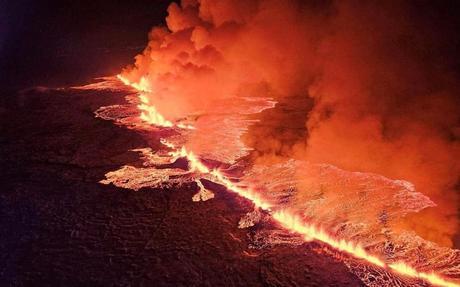
After weeks of intense seismic activity, a volcano has erupted in southwestern Iceland, just one day after the area reopened to tourists.
The eruption takes place just a few kilometers from Iceland's most popular tourist attraction, the Blue Lagoon wellness complex and hotels. It had partially reopened on Sunday, despite ongoing volcanic activity in the area: the decision to reopen was taken "in close cooperation with the authorities", the website said at the time.
The Blue Lagoon is now closed. The website states: "We have temporarily closed our facilities in Svartsengi. All guests with confirmed bookings will be contacted in the coming days."
A hotel near the eruption site has advised its guests to keep their windows closed from smoke from the canyon, traveler Jake Turner said this morning on X. "I'm in Iceland now, the hotel called every room and said keep the windows closed because the volcano has erupted."
According to Keflavik Airport's website, six flights scheduled to depart this morning - including the 6.50am flight to Stansted - have been postponed until after the afternoon. However, the Icelandic government maintains that the delays are not caused by the eruption and that other scheduled flights are departing as scheduled.
"There are no disruptions to flights to and from Iceland and international flight corridors remain open," the Icelandic government said in a statement this morning.
Online flight tracker flightradar24.com shows planes arriving and departing without interruption at Keflavík International Airport, 16 kilometers northwest of the eruption.
Icelandic police say they have raised the alert level as a result of the eruption, but there is currently no threat to life as lava flows from Grindavik, the nearest settlement.
Here's what you need to know if you've booked a trip to Iceland - and what your rights are if you choose to cancel your trip.
How long will the volcano risk in Iceland last?
"There has been some discussion led by the IMO that this eruption is part of an increase in activity that could bring decades of increased activity," said Matthew Watson, professor of volcanoes and climate at the University of Bristol.
The story continues
"The evidence for this is the fact that there have been multiple eruptions along the same set of rifts on the peninsula in recent years, and before that an 800-year rift."
This eruption could be the start of months of activity, Professor Watson warns: "Looking at previous eruptions in the region, a single eruption typically lasts for weeks to months: this is the case for the three most recent eruptions on the peninsula, for example. Some eruptions in Iceland may last longer."
Last month, residents of the nearby town of Grindavík were evacuated by the Icelandic Civil Protection Agency, amid warnings of a "river of magma", noxious gases and "fountains of fire" in the area.
The Reykjanes Peninsula is a major tourist area of Iceland, home to Keflavik Airport, the country's busiest air hub, connected to Britain by easyJet, British Airways and other major airlines.
Reykjavik, the capital of Iceland, is located about 50 km from the volcanic system.
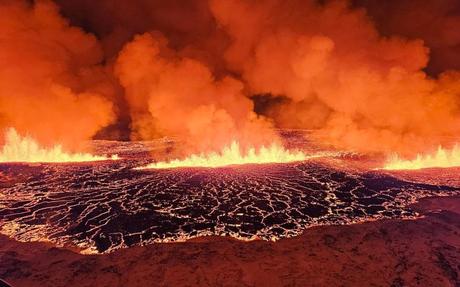
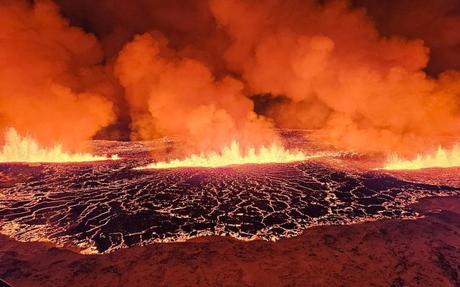
Will the Icelandic volcano affect flights, as it did during the Eyjafjallajokull ash cloud?
The billowing ash cloud from the Eyjafjallajokull volcano caused global travel disruption in the spring of 2010, amid concerns that the particles and debris could damage aircraft engines. Commercial flights across Europe were halted for almost a week, leaving 50,000 flights grounded and an estimated 10 million travelers stranded.
The disruption lasted almost a week and caused the highest level of air traffic disruption since World War II. Could this new wave of seismic activity lead to similar chaos?
No, because the activity takes place under solid ground and not under a glacier, says Paavo Nikkola, research scientist at the Geological Survey of Finland GTK.
"A volcanic ash cloud like in 2010 is now no longer possible," Nikkola told Finnish broadcaster Yle. "At the time, the ash was generated by a large explosive eruption under a glacier."
The region has experienced several eruptions in recent years, none of which affected flights, said a spokesperson for PLAY, a low-cost airline headquartered at Keflavik International Airport. "Iceland is no stranger to volcanic activity: three eruptions have occurred on the Reykjanes Peninsula in the past two years and there have been no disruptions to flights. It has some of the most advanced volcanic preparedness systems in the world to protect the public and is well prepared for any eventuality.
"Current seismic activity on the Reykjanes Peninsula is continuously monitored by the Icelandic Meteorological Office, the Department of Civil Protection and Emergency Management and a team of scientists from the University of Iceland for any changes."
Are flights to Iceland being cancelled?
"There are no disruptions to flights to and from Iceland and international flight corridors remain open," the Icelandic government said in a statement this morning.
Online flight tracker flightradar24.com shows planes arrived and departed without interruption at Keflavík International Airport, 10 miles (16 kilometers) northwest of the eruption, but some early morning departures were postponed until after noon.
Companies such as Icelandair, easyJet and British Airways connect Keflavik, the country's largest aviation hub, with Britain - and it is a key stopover for transatlantic flights. It is the gateway to Reykjavik, the country's capital, a 50-minute drive away.
'I do not think so [the eruption] will have a huge effect on air traffic," Thor Thordarson, professor of volcanology and petrology at the University of Iceland, told Bloomberg last night. "But potentially this will have a serious and significant impact on local communities and infrastructure, including the city of Grindavik, the Blue Lagoon and the Svartsengi power plant."
In recent weeks, airlines have told Telegraph Travel that they are "closely monitoring the situation". Last week, an easyJet spokesperson advised: "Our flight schedule is currently operating as normal, but we are closely monitoring the situation and should this change occur we will contact customers directly to provide advice regarding their flights."
A British Airways spokesperson said: "Our flights are operating as planned and we continue to monitor the situation closely. Should the situation change, we will contact customers directly."
Icelandair, the national airline, has said it cannot comment on the situation.
PLAY Airlines has also confirmed it will contact customers whose flights may be affected. An airline spokesperson added: "[PLAY] is continuously monitoring the situation together with the Icelandic government and the Meteorological Office and will provide timely updates via email and text message on any major developments that could affect flights.
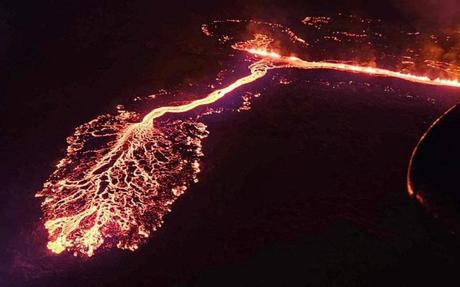
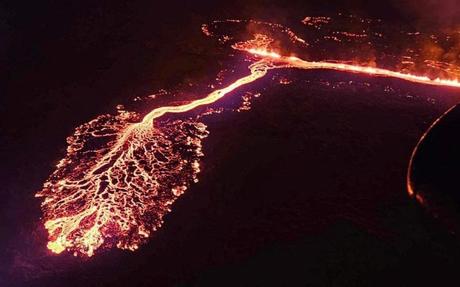
Is it safe to visit Iceland?
The FCDO currently does not warn against traveling to Iceland. Those heading to the region should "monitor local media for updates and follow advice from authorities regarding travel to the area," it advises.
Travelers should "check for warnings and advice from the: Icelandic Met Office, Safe Travel Island, Almannavarnadeild Facebook page and Twitter (@almannavarnir)."
I'm in Iceland now. Can I come home earlier?
That depends on your airline or tour operator. The FCDO does not currently warn against travel to or around Iceland, so your carrier is under no obligation to shorten your trip or offer a refund if you choose to return home early. As above, you should monitor the situation through the IMO's official channels.
If you change your travel plans, chances are you will have to pay for this privilege. However, if you have a flexible ticket, the fee may be waived. Please contact your airline or tour operator directly before taking any decisive action.
Should I cancel my holiday to Iceland?
Unless the FCDO changes its advice to warn against travel to Iceland or the area you are going to, chances are your holiday will go as planned.
If you choose to cancel your holiday it is very unlikely that you will be covered by travel insurance.
Holidays in Iceland are currently going ahead as usual, says Georgina Hancock, marketing director of regional specialist Discover the World. "So far we have had to rearrange some of the itineraries of our customers who would visit the Reykjanes area, including the Blue Lagoon. They are all still traveling, but will only visit other areas in South Iceland."
A spokesperson for easyJet Holidays said: "Our holidays are currently going ahead as planned, but we are continuing to monitor the situation closely and should anything change we will contact our customers directly."
Am I covered by travel insurance when I visit Iceland?
Yes, as long as the FCDO does not warn against travel to Iceland. If you have any concerns, contact your provider directly - and make sure you keep the 'emergency number' handy when abroad, in case the situation worsens.
Where is the Blue Lagoon - and is it safe to visit?
The Blue Lagoon wellness complex is currently closed to visitors.
The seismic activity is concentrated in the Fagradalsfjall volcanic system of the Reykjanes Peninsula, in southwestern Iceland. Svartsengi, where the Blue Lagoon is located, has experienced extensive earthquakes and land rise in recent weeks.
"Magma flows under Svartsengi and the land there continues to rise. What we are looking at now is a new chapter," Víðir Reynisson, head of Iceland's Civil Protection and Emergency Management, told local media last weekend.
The Blue Lagoon geothermal pool, Blue Cafe, Lava Restaurant, Retreat Spa, Spa Restaurant and the on-site Blue Lagoon Skincare store resumed trading just one day before Monday night's eruption, on Sunday 17 December.
The wellness complex in Svartsengi, near Keflavik Airport, had been closed since November 9 due to seismic activity on the Reykjanes Peninsula.
